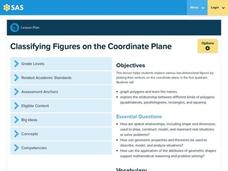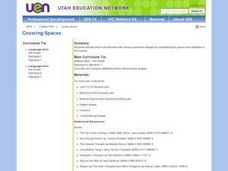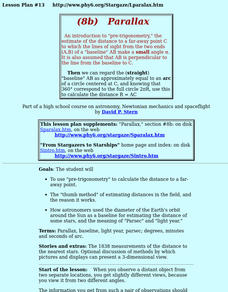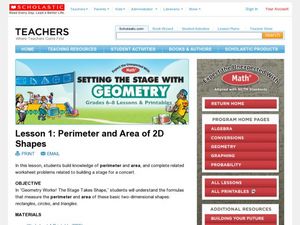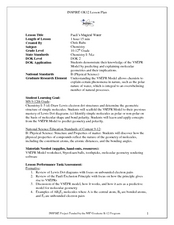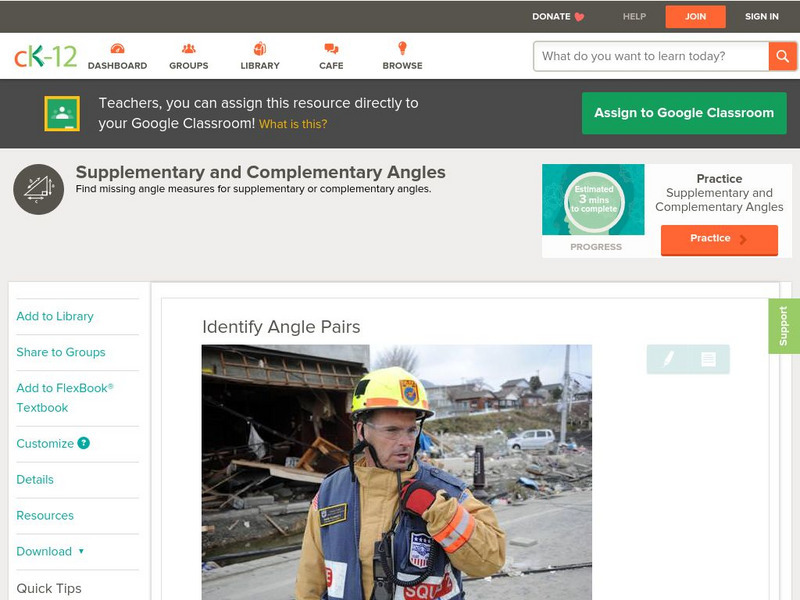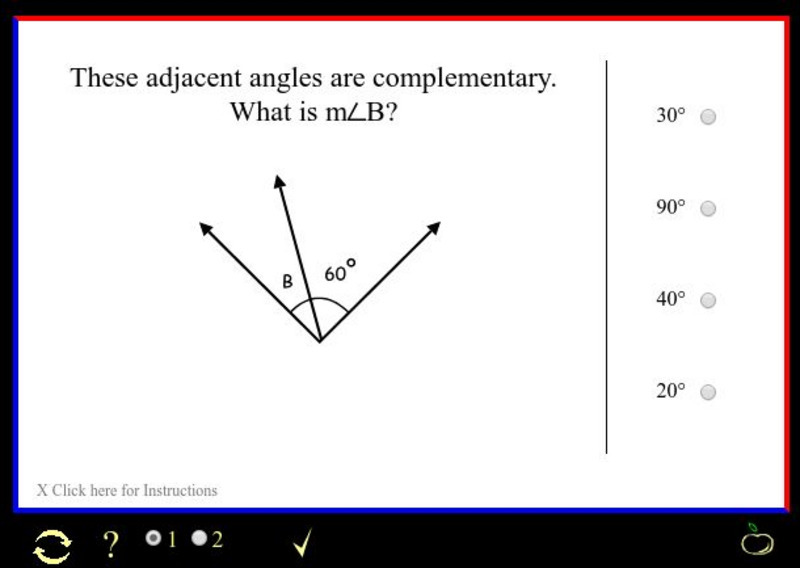Curated OER
The Minimal Distance Point from the Vertices of a Triangle
Students calculate the distance from the vertex of a triangle to the center. In this geometry lesson, students find the shortest distance between a point and the vertex of a triangle. They relate this concept of distance to the real world.
Curated OER
Areas of Polygons
Pupils calculate the are of regular polygons. In this geometry lesson, students create polygons on the computer and move it around to create different shapes. They explore the area of different polygons and how they inter-relate.
Pennsylvania Department of Education
Classifying Figures on the Coordinate Plane
Fifth graders use estimation to solve word problems. In this fractions lesson, 5th graders decide whether or not an answer to a work problem is reasonable by applying their knowledge of fractions, decimals and estimation. This lesson...
Curated OER
Leveled Problem Solving Quadrilaterals and Other Polygons
In this quadrilaterals and polygons worksheet, students solve the problems using quadrilaterals and other polygons. Students solve six problems.
Curated OER
Geo Jammin'
Pupils compare and contrast related two- and three-dimensional shapes, and complete a Venn diagram illustrating the attributes of each. Using a poem pattern from another activity, students use data from the diagram to write an attribute...
Curated OER
Covering Spaces
Third graders become more familiar with various geometric shapes by completing the games and activities in this lesson. They keep track of the number of each shape they use in each of the three ways.
Pennsylvania Department of Education
Introducing the Coordinate Plane
Fifth graders practice using estimation. In this estimation lesson, 5th graders add, subtract, multiple, and divide using whole numbers, fractions, and decimals. Students decide upon instances when estimation is more appropriate than...
Curated OER
Parallax
High schoolers discover how astronomers used the diameter of the Earth's orbit around the Sun as a baseline for estimating the distance of some stars, and the meaning of "Parsec" and "light year."
Curated OER
Perimeter and Area of 2D Shapes
Learners find the perimeter and area of circles, triangles, and rectangles. In this perimeter and area instructional activity, the teacher gives students formulas for each shape and measurement and works through examples on the board....
Curated OER
Travel, Photography and ISLA
High schoolers examine and research habitats, and analyze how to shoot travel photographs. They take five environmental portraits, present them to the class, and critique the students' slides.
Curated OER
Peak Flow Meter Exercise
Students investigate the concept of lung capacity. They use flow meters to measure the maximum capacity of themselves and others. The data is collected in order to make some conclusions concerning the mean of individual lung capacity....
Curated OER
Pauli's Magical Water
Students predict the shape of molecules using VSEPR theory. In this chemistry lesson, students differentiate a polar and nonpolar molecule. They discuss why water's polarity is very important.
Curated OER
Creating Bonds
In this creating bonds worksheet, students create 2-D and 3-D models of the molecular formula provided. Students complete a chart of information about the molecular formula given.
Curated OER
Polarization Of Light
Students discover that polarization filters block incoming light from passing through when filters are positioned perpendicularly to each other. They explore some of the uses of polarization filters within our society.
Curated OER
A Sense of Location: The Mental Map
Students consider the ways a mental maps of geographic landmarks can help migrating animals stay on the correct course.
Curated OER
How far is a km?
Students explore the size of a kilometer and the time it takes to cover this distance. They develop a concept of a km. They measure a distance of 1 km and the time taken to cover it.
Curated OER
Visiting Grandma
First graders investigate the aspect of time, including days of the week using a calendar. They use problem solving strategies and a monthly calendar to find a solution to the problem.
Curated OER
Breaking News English: Shuttle Discovery Launches Successfully
For this English worksheet, students read "Shuttle Discovery Launches Successfully," and then respond to 47 fill in the blank, 7 short answer, 20 matching, and 8 true or false questions about the selection.
CK-12 Foundation
Ck 12: Geometry: Supplementary and Complementary Angle Pairs
[Free Registration/Login may be required to access all resource tools.] Identify angle pairs as complementary angles, supplementary angles or neither
Other
Nearpod: Angle Pairs
In this lesson on angle pairs, students explore the relationship betwen angles by learning about adjacent, complementary, supplementary, and vertical angles.
Mr. Martini's Classroom
Mr. Martini's Classroom: Geometry Special Angle Pairs and Parallel Transversals
Students are challenged to identify and measure angles created by parallel lines and a transversal as well as complementary and supplementary pairs.
CK-12 Foundation
Ck 12: Geometry: Supplementary and Complementary Angle Pairs
[Free Registration/Login may be required to access all resource tools.] Classify supplementary and complementary pairs of angles.
CK-12 Foundation
Ck 12: Geometry: Supplementary and Complementary Angle Pairs
[Free Registration/Login may be required to access all resource tools.] Use reasoning to figure out the measures of missing angle measures
CK-12 Foundation
Ck 12: Geometry: Angle Pairs
[Free Registration/Login may be required to access all resource tools.] Finding the measures of angle pairs including the measure of missing angles by using given information.
Other popular searches
- Special Angle Pairs
- Geometry Angle Pairs
- Smart Board Angle Pairs
- Angle Pairs Ell
- Angle Pairs in Parallel
- Geometry Using Angle Pairs
- Angle Pairs With Answer
- Geometry Angle Pairs
- Angle Pairs Homework 14.2
- Angle Pairs Homework 142
- Angle Pairs Relationships


